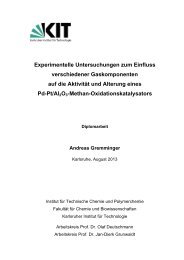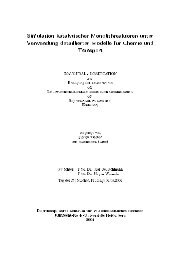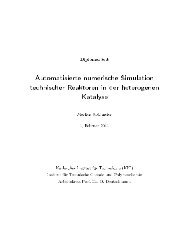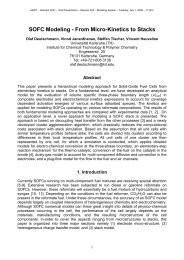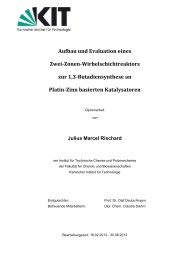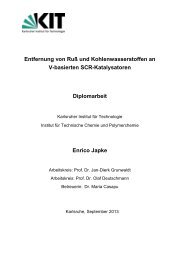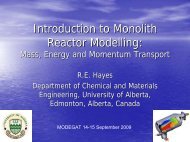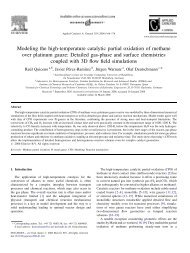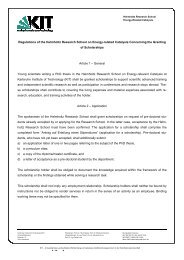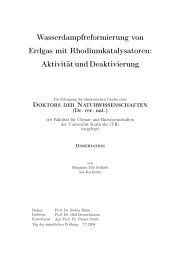Fuel Processing for Fuel Cells - Institut für Technische Chemie und ...
Fuel Processing for Fuel Cells - Institut für Technische Chemie und ...
Fuel Processing for Fuel Cells - Institut für Technische Chemie und ...
Create successful ePaper yourself
Turn your PDF publications into a flip-book with our unique Google optimized e-Paper software.
Author's personal copy<br />
16 Torsten Kaltschmitt and Olaf Deutschmann<br />
Raw gas<br />
Gas–Oil<br />
separator<br />
Water<br />
removal<br />
Condensate<br />
H 2 O<br />
Acid gas<br />
removal<br />
Dehydrat<br />
ion<br />
Mercury<br />
removal<br />
Further processing<br />
Ethane<br />
Propane<br />
Butane<br />
NGL<br />
fractionator<br />
NGL recovery<br />
/<br />
demethanizer<br />
Nitrogen<br />
rejection<br />
Pentanes (+)<br />
N 2<br />
To gas pipeline<br />
Figure 2<br />
Simplified block flow diagram of a typical gas processing plant.<br />
applications. Direct methanol fuel cell (DMFC) can be directly fueled with<br />
methanol without any upstream fuel processor <strong>for</strong> hydrogen production.<br />
3.4.3 Ethanol<br />
Ethanol and higher alcohols have been identified as potential additives<br />
<strong>for</strong> fuel in fuel cell applications. The production of alcohols C > 1 is often<br />
obtained by the catalytic conversion of syngas, which can derive from<br />
several carbon sources, such as biomass, coal, or natural gas. Rhodiumbased<br />
catalysts give high selectivities to C 2þ oxygenates, but are quite<br />
costly. Cupper-based catalysts promoted with alkali, transition metals<br />
and their oxides, and rare earth oxides are <strong>und</strong>er current research as<br />
substituents <strong>for</strong> the expensive precious metal catalysts. An optimal amount<br />
of promoter with well-defined reaction conditions is necessary to suppress<br />
<strong>und</strong>esired by-products, <strong>for</strong> example, methane (Gupta et al., 2011). Apart<br />
from Rh- and Cu-based catalysts, modified Fischer–Tropsch and Mo-based<br />
catalysts can be used (Spivey and Egbebi, 2007). Ethanol improves the<br />
octane rating of gasoline and reduces emissions of NO x and unburned



